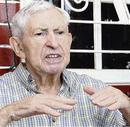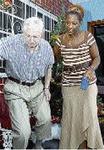

Phots by Peta-Gaye Clachar/Staff Photographer
LEFT: Holocaust survivor, Morris Semsky, telling his horror story.
RIGHT: Joyce Jackson is caregiver of Morris Semsky.
Misha Lobban, Contributor
Morris Semsky, 88-year-old Polish-Jew and Holocaust survivor, made his first trip to Jamaica on December 20 to spend the Christmas holidays with his Jamaican caregiver, Joyce Brown-Jackson and her family.
Semsky, who has been staying in Kingston, declares excitedly that he has been basking in the warmth and freshness of the Jamaican air and the hospitality and friendliness of the Jamaicans he has met.
Jamaica, he states, reminds him of his birth place in Czestochowa, Poland, where he spent his early years with his family before the invasion by Germans in the 1940s.
On December 25, 2007, he had the unforgettable experience of a traditional Jamaican Christmas. He and a large gathering of the Jackson family and their extended relatives and friends sat down to enjoy a sumptuous dinner of curried goat, curried shrimp, honey-baked ham, baked chicken, gungo peas and rice, topped off by the customary sorrel drink and Christmas pudding.
Born May 20, 1919, Semsky speaks five languages - Polish, Yiddish, Hebrew, German and English. He still vividly recalls his experience in a concentration camp from 1941 to 1945.
Although still pained by the memories of witnessing the brutal death of his parents, two brothers and his sister by the German soldiers when they invaded Poland, and the traumatic experience of life in a concentration camp, he recounted his story to Outlook.
Forced labour
He was in his early 20s at the time and was taken to work under forced labour at a concentration camp near his hometown. The camp produced ammunitions.
"It's impossible to believe and unspeakable what people can do to other people. In the mornings we were fed dough and black coffee. Sometimes we were fed broth made with the skin of potatoes which the Germans ate.
"They had parties where they would beat us for fun until we screamed from the pain. By the time we were liberated, we couldn't walk anymore. I was limping. When we came out, we came out as cripples, not white or black Jews, but cripples."
Joyce interjects to confirm the traumatic effect of the concentration camp on Morris even to this day. "In the mornings, it's very hard to get him out of bed because he still relives the experience of being stripped every morning and placed out in the snow where they were beaten by the soldiers before they were put to work."
Semsky attributes his survival to his fighting spirit and a determination to live. "I was a fighter and I fought to stay alive. I prayed every day to get the next piece of bread to stay alive."
He recounts, sadly, the story of how his wife, Miriam, was beaten severely for stealing a piece of bread to feed him.
Prior to the war, Semsky and Miriam became acquainted through an athletic club in their hometown, where she was the women's ping-pong champion and he was the men's champion. During their time in the concentration camp, their friendship grew as they struggled to survive, and in 1942, they were secretly married by a Rabbi who was among the prisoners in the camp. Miriam worked in the kitchen and she would steal bread to feed him as the labourers were given only one meal per day. One day she was caught by German soldiers.
"Because of that piece of bread she was taken to the warehouse and beaten 24 times with a cane until she was permanently deformed. Her hip was broken and she walked with a limp after that."
On January 15, 1945, Semsky, his wife, and other Jews who survived the concentration camp, were freed by the Russian army.
In August 1946, he took his wife, five-month old son, Arnie, and his sister-in-law and her husband to Germany to live and await the processing of their immigration papers to the United States of America. Three years later, in August 1949, they arrived in the United States.
During a telephone interview with Outlook, Arnie Semsky, a marketing consultant, provides services to clients including ABC Sports and ESPN, reminisced about his father's early years in America.
"My father was a professional cake baker, a fifth generation of cake bakers in his family. And so when he came to the U.S., he went to work in a bakery. He worked hard and saved until he was able to own his first bakery in the Bronx in 1950, specialising in baking and decorating cakes. At that time, he barely spoke English, but he worked hard to make it a success. He did the baking and my mother worked in the front handling the sales.
"My father's story is a miraculous one in that both he and my mother survived the horrors of the Holocaust and managed to make a successful life here in the U.S. I think out of his experience he has valued the importance of family and friends because both he and my mother lost their families and friends during the Holocaust."
According to Arnie, before the war, there were 35,000 Jews in his father's hometown, Czestochowa, but after the war, only a few thousand Jews were left, including his parents.
In 1976, Semsky and his wife sold their business and retired to North Miami Beach, Florida, where he served for several years as president of a Holocaust survivors group in Florida. The organisation takes care of the welfare - health care, nursing and other needs - of Jewish survivors of the Holocaust who reside in Florida. Mrs. Semsky died on February 4, 2004 of diabetes and old age.
Semsky's experience has left him with an exceptionally kind and compassionate view of life and people. He explains that he has a love for humanity, irrespective of a person's colour and nationality.
He speaks adoringly of Joyce, whom he says is trustworthy and takes very good care of him. "Joyce doesn't eat breakfast or a meal before making sure that I have eaten. She takes very good care of me and my needs."
Joyce started working with Semsky as his caregiver in 2005. She describes him as a good person with a compassionate heart.
"He doesn't see me as an employee. He treats me as part of his family and out of his experience he is always concerned about whether others have eaten. The first thing he asks whenever someone comes to the house is that I should give them something to eat," she says.
At the age of 88, Semsky, remains a true survivor with a wonderful sense of humour and deep love for humanity.

